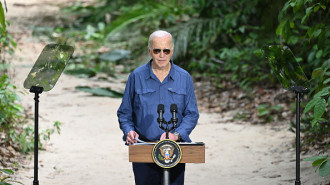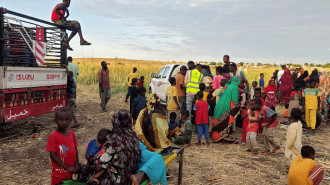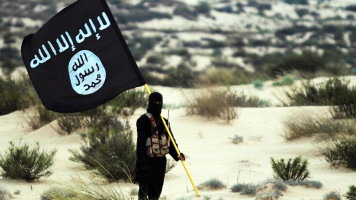Nigerian delegation says Niger junta is open to diplomacy
Coup leaders in Niger are open to diplomacy to resolve a standoff with West Africa's regional bloc, a group of senior Nigerian Islamic scholars said on Sunday after meeting the junta in Niamey.
Their visit comes as the Economic Community of West African States (ECOWAS) explores its options to restore civilian rule in Niger, including potential military intervention, following the 26 July ouster of President Mohamed Bazoum - the seventh coup in West and Central Africa in three years.
In a sign the bloc is still pushing for a peaceful resolution, ECOWAS chairman and Nigerian President Bola Tinubu approved Saturday's mission to Niamey by the delegation of Islamic scholars, who had vowed to promote dialogue.
The group's meeting with junta leader General Abdourahamane Tiani lasted several hours, said Sheikh Abdullahi Bala Lau, who led the delegation.
"He said their doors were open to explore diplomacy and peace in resolving the matter," Lau said in a statement on Sunday.
Tiani reportedly emphasised the historic ties between Niger and Nigeria, saying the countries "were not only neighbours but brothers and sisters who should resolve issues amicably."
There was no immediate comment from the junta on the meeting, but Tiani's reported comments are one of few recent signs he is open to negotiation.
The coup leaders' previous rebuffs of diplomatic efforts by ECOWAS, the United States and others had raised the spectre of further conflict in the impoverished Sahel region of West Africa, which is already dealing with a deadly Islamist insurgency.
With diplomacy faltering last week, ECOWAS activated a standby military force it said would be deployed as a last resort if talks failed.
For now, the bloc is pursuing efforts for further negotiations. On Saturday, the bloc's parliament said it would ask Tinubu, who holds the bloc's revolving chairmanship, to get his permission to go to Niger, its spokesperson said.
Shoring up support
Any military intervention by the bloc could further strain regional ties as juntas in Mali, Burkina Faso, and Guinea have voiced support for Niger's new military authorities.
On Saturday, Tiani sent a delegation, led by his defence chief General Moussa Salaou Barmou, to the Guinean capital Conakry to thank leaders there for their support - a sign of the junta's desire to affirm alliances as it stands up to regional and other powers.
"We are pan-African. When our people have problems, we are always present, and we will always be there," Guinea's interim president, Mamady Doumbouya, said at the meeting, according to a video shared late on Saturday night by the presidency.
In the footage, Doumbouya - who led a coup in Guinea in September 2021 - did not say whether Conakry's support for the Niger junta would include military backing if ECOWAS decided to use military force. Mali and Burkina Faso have already said they would help defend Niger.
At stake is not just the fate of Niger - a major uranium producer and Western ally in the fight against the Islamists - but also the influence of rival global powers with strategic interests in the region.
US, French, German and Italian troops are stationed in Niger, in a region where local affiliates of al-Qaeda and Islamic State have killed thousands and displaced millions.
Meanwhile, Russian influence has grown as insecurity increases, democracy erodes, and leaders seek new partners to restore order.
Western powers fear Russia's clout could increase if the junta in Niger follows Mali and Burkina Faso, which ejected the troops of former colonial power France after coups in those countries.
(Reuters)







 Follow the Middle East's top stories in English at The New Arab on Google News
Follow the Middle East's top stories in English at The New Arab on Google News


